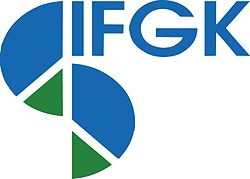Institute for Peace Work and Nonviolent Conflict Resolution
| Institute for Peace Work and Nonviolent Conflict Resolution (IFGK) |
|
|---|---|

|
|
| purpose | Combining theory and practice of nonviolent action through scientific research and continuous exchange with activists |
| Chair: | Martin Arnold, Achim Schmitz, Barbara Müller |
| Establishment date: | 1991 |
| Seat : | 55491 Wahlenau |
| Website: | http://www.ifgk.de/ |
The Institute for Peace Work and Nonviolent Conflict Resolution (IFGK) was founded in 1991 by several people from the BSV ( Bund für Soziale Defense ). The seat of the non-profit association is Wahlenau . The management of the IFGK is carried out by several employees. The entire IFGK association work is voluntary. The IFGK is primarily financed by membership fees of the association and its sponsoring group, donations and grants for research projects ( third-party funds ). The IFGK's annual budget is around EUR 20,000.
aims
The IFGK is formed by scientists who are based in different places in Germany. Some do science as a livelihood, others in addition to their profession. What they all have in common is that they want to be a catalyst for learning, understanding and acting in nonviolence. They see themselves as part of a global movement for social justice, peace and the preservation of livelihoods.
Work and focus
The IFGK's work focuses on (action) research, advisory work and events.
The action research is concerned with conditions, progressive forms and effects of non-violent action. The discussion of the results with those practicing is one of the main activities of the IFGK. In addition, evaluations and other commissioned studies are carried out. The publication of working papers, books and articles is supplemented by teaching and educational activities on the subject of "Nonviolent Conflict Resolution".
Study days
The study days take place once or twice a year in a nationwide framework. They have been offering the opportunity to present scientific work on the subject of nonviolence and to discuss it in a supportive and competent group. It can be about initial ideas for a term paper, or about book projects or even completed habilitation theses. It is an important concern of the institute to combine theory and practice of peace work. Instead of fees, there is constructive thinking, learning from and with one another. The events are open to anyone interested.
International networking, cooperation and agencies
The IFGK is a working group in the Federation for Social Defense and a member of the Platform for Civil Conflict Management and the Working Group for Peace and Conflict Research (AFK). Christine Schweitzer represents the platform on the Federal Government's Advisory Council on the "Civilian Crisis Prevention" action plan . The institute is also involved in War Resisters' International (WRI, London). Christine Schweitzer is currently participating in the international conferences and member assemblies of WRI for the institute. Other initiatives in which IFGK members are active are e.g. B. the network peace education in Rhineland-Palatinate and the working group Gütekraft .
Known members
- Martin Arnold
- Anne Dietrich
- Reinhard Eismann
- Albert Fuchs
- Gudrun Knittel
- Mirjam Mahler
- Barbara Mueller
- Achim Schmitz
- Christine Schweitzer
- Roland Vogt
Publications
Series "Studies on Nonviolence" in LIT-Verlag
- Volume 1: Barbara Müller: Passive Resistance in the Ruhr War. A case study on non-violent interstate conflict resolution and its conditions for success. Dissertation Berlin, Münster 1995
- Volume 2: Christian W. Büttner: Peace Brigades: Civil conflict management with nonviolent methods. Münster 1995 ISBN 3-8258-2547-7
- Volume 3: Uwe Painke: A district makes you mobile. Community against violent crime. Neighborhood Safety in the US. Hamburg 2001 ISBN 3-8258-5600-3 .
- Volume 4: Burkhard Bläsi: Conflict transformation through the power of kindness. Interpersonal change processes. Münster 2001. ISBN 3-8258-5731-X
Working papers: self-published, brochure. The working papers can be downloaded free of charge as pdf from the website.
- AP 1 - out of print
- WP 2 How does military force become a "peace-building measure"?
- WP 3 On the theory and practice of social defense
- WP 4 Opportunities to optimize peacekeeping, peacemaking and peacebuilding
- WP 5 International support for the protection of human rights
- WP 6 Optimizing Peacekeeping, Peacemaking and Peacebuilding
- AP 7 - out of print
- AP 8 Where's the moral of the story?
- WP 9 Nonviolent Interventions in Former Yugoslavia
- WP 10 Bundeswehr and right-wing extremism
- AP 11 War and displacement in Kosovo
- AP 12 Kosovo: Preparations for the time after the war
- WP 13 Perception of violence and the concept of violence
- AP 14 campaigns of the peace movement of the nineties
- WP 15 Right-wing extremist orientation, acceptance of violence and violence
- AP 16 power of goodness (Satjagrah)
- WP 17 Opportunities for promoting peace alliances
- WP 18 What does quality research investigate?
- WP 19 culture and war
- WP 20 On the topicality of social defense
- WP 21 A socio-philosophical further thinking of the power of goodness
- WP 22 Nonviolent Interventions Plan and Adapt
- AP 23 Civilian Peacekeeping - A Barely Tapped Resource
- AP 24 For a world without armaments and military
- AP 25 On 9/11 - only political-media constructions? A meta-critical attempt
- WP 26 Preventing or Stopping Wars - The Contribution of Peace Movements